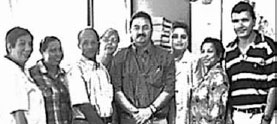
|
|||
|
|
FALL, 2002: Volume 7, Issue 3 FPT�s Colombia Exploratory Team, May 29-June 19, 2002 Note: A more detailed report will be mailed to donors and others on the Colombia mailing list. To receive it, please notify Val at the e-mail address below. The report will also be published on the Web at: www.quaker.org/fptp/pic_report2002.html The team, made up of three US citizens and one Ecuadorian was in Colombia May 29-June 19, at the invitation of Mennonite agency, JustaPaz, the Christian Center for Justice Peace and Nonviolent Action. Our time was divided into three major parts: meetings and interviews with Colombian groups and individuals; travel to two sites away from Bogot�, the capital; and offering four Alternatives to Violence Project (AVP) workshops.
We had twenty interviews/meetings in the first week in Bogot�, with Colombian and international groups�some as long as two hours and some as short as 30 minutes. All were intended to help us understand the current situation, the work of the group or organization, and/or what place there might be for FPT or AVP work in Colombia. We met with the American Friends Service Committee�s QIAR (Quaker International Affairs Representative), representatives from several Mennonite agencies, Peace Brigades International, Christian Peacemaker Teams, Fellowship of Reconciliation volunteers, Witness for Peace, the International Red Cross, the Committee in Solidarity with Political Prisoners, the Catholic Justicia y Paz group which supports several Peace Communities, a representative of the Permanent Assembly for Peace, the Evangelical (Protestant) Council, and the US Embassy�s Human Rights Officer. We worshipped with several Mennonite churches and with the Bogot� Meeting of Friends. Outside of Bogot�, two of us traveled to the city of Sincelejo and two to the Peace Community of San Jos� de Apartad�. In Sincelejo we were hosted by the Caribe branch of JustaPaz. We visited the school they run for children of displaced families, two communities of displaced people, the governmental Red de Solidaridad (Solidarity Network) which offers services to some displaced people, a town of weavers, and the farm that JustaPaz hopes will help support the school in the future. In the Peace Community of San Jos� de Apartad� we visited the town of San Jos� (in which Peace Brigades International has a permanent presence) and the hamlet of La Uni�n in which two Fellowship of Reconciliation volunteers, one of whom is a Quaker, live. These communities are at risk of attack from all of the armed actors (the Army, paramilitaries and the guerrillas) and have formally stated that they will not accept any armed group inside their communities. Despite this, armed groups have passed through several times, and over 70 people have been killed by paramilitary groups over the last 5 years. Our team members met with many individuals and with the community councils of both San Jos� and La Uni�n. In these first two weeks of our visit, we were repeatedly told that there was a need for more international groups to accompany Colombians in their search for peace. In the case of the Peace Communities, the need is mainly for physical presence in the hope that international witnesses can prevent killings or disappearances of their members. In the case of organizations working to build peace, there is a need for physical accompaniment of some of the leaders, for international contacts which will provide some funding and other resources, and for training or information about techniques that they can use for peacebuilding. We offered four complete Basic AVP workshops which were attended by 61 people. Attenders included workers for Mennonite groups, the Committee in Solidarity with Political Prisoners, the ecumenical Christian Prison Ministry, and demilitarized guerrillas. Among both the secular and religiously oriented groups, the answer to our question of whether AVP was useful for Colombians was �Yes!� The head of JustaPaz, Ricardo Esqu�via, said, �The groups involved in the peace process need to learn about Transforming Power and nonviolence, because they need to be able to work together better.� AVP workshops helped us to understand the lives and needs of Colombians in a much more intimate way than visits with organizations�we learned that demilitarized guerrillas live in special safe hostels and have to take new names to protect them from both reprisals from the paramilitaries and their former comrades in arms; that a vital personal faith�expressed often in very Evangelical terms�animates much of the efforts for peace and justice; and that desires for peace don�t always translate into an everyday commitment to nonviolence. We believe that further work in Colombia will offer Friends a chance to refine the Peace Testimony. In the very real fire of violence, we can offer some of the tools we�ve developed in our 350 years of work as pacifists, challenge ourselves to take some concrete steps to address violence that has some roots in the policies of the US government and share the lives of courageous and inspiring people. FPT will consider offering further AVP and other peacebuilding workshops in Colombia in the near future. If you are a Spanish-speaking AVP facilitator who would be willing to consider participating in our work, please notify Val Liveoak at [email protected] |
||
